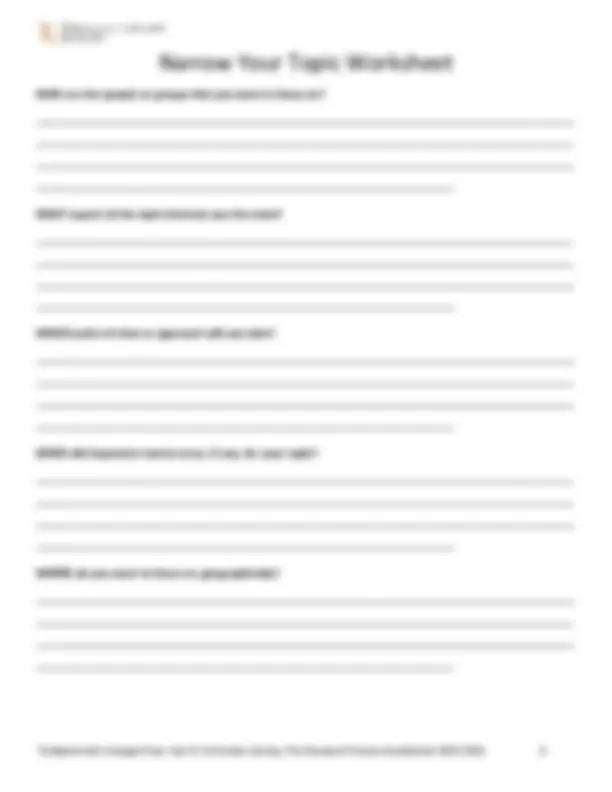



Study with the several resources on Docsity

Earn points by helping other students or get them with a premium plan


Prepare for your exams
Study with the several resources on Docsity

Earn points to download
Earn points by helping other students or get them with a premium plan
Community
Ask the community for help and clear up your study doubts
Discover the best universities in your country according to Docsity users
Free resources
Download our free guides on studying techniques, anxiety management strategies, and thesis advice from Docsity tutors
Nên xem, nên đọc, nên áp dụng, cho ca bận chuyên nghành TATM
Typology: Lecture notes
1 / 2

This page cannot be seen from the preview
Don't miss anything!


*Adapted with changes from: Kurt R. Schmeller Library, The Research Process Guidebook 2015-2016 8
Have you ever picked a topic, did some research and realized… The information you found was too vague or had a general quality to it That you became overwhelmed by the amount of information you found Or that you began to get frustrated- you didn’t know which direction to go …well, it might have been, because your topic was TOO BROAD. Consider the following questions that may help narrow your topic and guide your research. For an example, these are some ways in which to narrow the broad topic of EDUCATION: WHO are the people or groups that you want to focus on? For example: college Students, minorities, Kindergarten – 12 th^ grade, teachers… WHAT aspect of the topic interests you? For example: study habits, bullying, education reform, desegregation… WHICH point of view or approach will you take? For example: legal, ethical, psychological, scientific, historical, political… WHEN did important events occur, if any? For example: today, 1950’s, within the next ten years, during President Reagan’s years… WHERE do you want to focus, geographically? For example: Alabama, New York, Europe, China… At times, it is possible to create several distinct research tracks from a singular broad topic. Take a look at these: Track #1- college students > study habits > psychological > today > China Track #2- K-12 > education reform > historical > President Reagan’s years > New York Track #3- minorities > desegregation > legal > 1950’s > Alabama
*Adapted with changes from: Kurt R. Schmeller Library, The Research Process Guidebook 2015-2016 9
WHO are the people or groups that you want to focus on?
WHAT aspect of the topic interests you the most?
WHICH point of view or approach will you take?
WHEN did important events occur, if any, for your topic?
WHERE do you want to focus on, geographically?